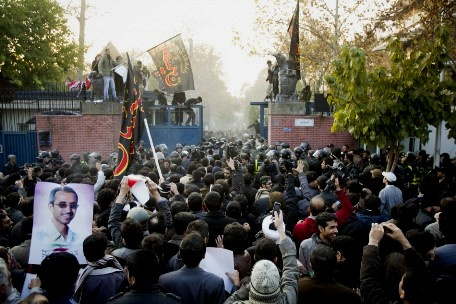British Embassy incident’s lessons for the West

Mehr News - On November 27, after the Iranian parliament approved a bill mandating that Iran-Britain relations be downgraded and the British ambassador expelled, thousands of Iranian students and other citizens held a demonstration to protest against London’s latest round of sanctions imposed on the Islamic Republic and to demand that Tehran cut off all diplomatic relations with London.
It was the Iranian people’s biggest demonstration against British policy toward Iran and led to the closure of the Iranian Embassy in London and the expulsion of British diplomatic staff from Tehran.
The main question relating to these developments is: What does the expulsion of British diplomats from Tehran tell the West?
First of all, it proved that sanctions cannot force the Iranian government to come to the negotiating table. Putting more pressure on Iran to compel the country to change its stances is an irrational and outdated policy that has not worked for over 30 years, since the victory of Iran’s Islamic Revolution in 1979.
Second, imposing more sanctions on Iran may encourage Iran to take more drastic measures on various issues rather than soften its position.
Third, through such action, the West will definitely lose the battle for Iranian people’s hearts and minds.
Iranian nationalism is a force to be reckoned with, and if it is given free rein, nothing can stop it, and the West will no longer be able to find any supporter in Iran to help it pursue its policies. The Iranian students made one simple response to British policy, which the West must take seriously.
Fourth, the Iranian people’s demonstration against the UK was a response to British policies toward the country since the 17th century, when the country first began meddling in the Persian Gulf region. It was not only a response to the sanctions that London imposed on the Central Bank of Iran. So the West cannot simply interpret the students’ decision to enter the British Embassy as a response to the imposition of more sanctions. The sanctions were only a catalyst for the action.
Fifth, continuing diplomatic and political relations with Western countries while they are holding meetings every day to discuss the imposition of more sanctions on Iran, and even to threaten to launch a military attack against Iran, would be meaningless. They cannot be allowed to use political relations with Iran as leverage to increase the pressure on the country.
Last but not the least, the Iranian people have proven that they do not worry about diplomatic relations with other countries being cut.
While the Iranian administration and parliament observe a kind of conservatism in their policies, the Iranian people do not have these restraints. This indicates that the Iranian people not only do not fear economic isolation but also do not fear political isolation.

